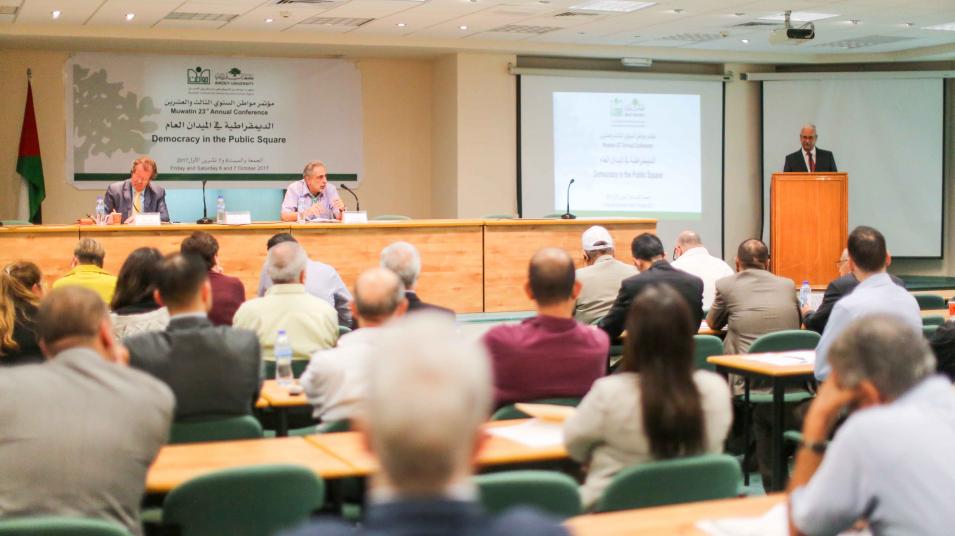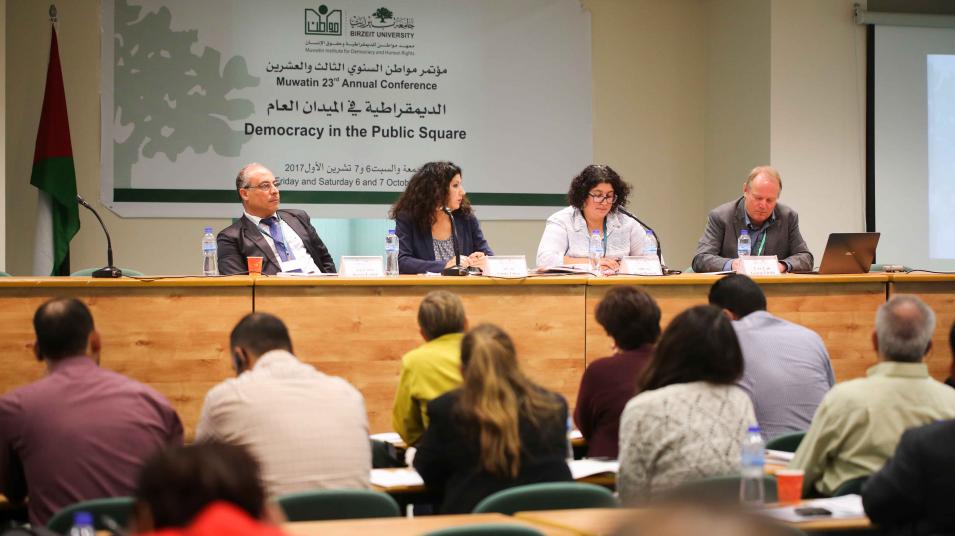Annual Muwatin conference discusses changing forms of democracy
Birzeit University hosted the 23rd annual Muwatin conference on the 6th and 7th of October 2017. Held on the university campus under the title “Democracy in the Public Square,” the conference brought attention to issues surrounding prospects for democracy and its effects both locally, within a Palestinian context, and globally.
President of the University Dr. Abedellatif Abu Hijleh affirmed the importance of the annual Muwatin conference in his opening speech, citing its appeal to the wider Palestinian community as well as its importance to future Palestinian issues. The president also noted the intersection of the conference’s aims with that of Birzeit University in general, with focus on core issues such as freedom, justice, and equality. The President further highlighted the importance of ending the Palestinian split, hoping that reconciliation will become a catalyst by which Palestinian society can lay the foundations of democracy.
Director of the Muwatin Institute Dr. Mudar Kassis noted the conference’s attempts to move the discussion of democracy into the public sphere, saying, “The Muwatin Institute owes the community its ability to force essential issues to the surface, and its ability to keep a hand extended towards society, while also remaining professional and academic.” Dr. Kassis also called for group action, adding, “The need arises for a redefinition of democracy instead of attempts to explain it, and this calls for a joint effort by everyone.”
The conference began with a keynote address delivered by the Scientific Director of the Ludwig Boltzmann Institute for Human Rights and former United Nations Special Rapporteur on Torture Manfred Novak, who spoke on the nature and impact of the neoliberal system, citing its role in human rights violations.
The first session of the conference, which followed the keynote address, was held under the guidance of Dr. Linda Tabar, Visiting Scholar of Middle East Studies at Brown University, and featured studies on issues in contemporary democracy, such as “Legalizing Democracy or Democratizing Law?”, presented by Dr. Reem Batma on behalf of Professor Reem Bahdi, who was not able to make the trip to Palestine. The paper discussed the apparent chasm between the rule of law and democracy, specifically in cases in which the rule of law is abused to benefit those in power. Faculty member at the Department of Political Science Dr. Basem Ezbidi also presented a study, titled “The Malaise of the Liberal Model of Democracy,” delving into the question of whether the current state of disarray for democracy is a mere bump in the road, or sign of a more permanent alteration.
The second session, headed by the Chair of the Board of Trustees of the Muwatin Institute, Dr. Mamdouh Al-Aker, tackled the future and prospects for democracy in Palestine. The first paper of the session, “The Absent Question in the Current Palestinian Situation,” was presented by Professor of Philosophy in the Faculty of Arts at Birzeit University Dr. George Giacaman. The paper argued that there is a deeper, more substantial issue at play in the Palestinian political scene, discussions of which have been notably, paradoxically absent.
The following presentation, by the author of the book Palestine Ltd.: Neoliberalism and Nationalism in the Occupied Territory, Dr. Tawfiq Haddad, dove into the effects of neoliberalism on Palestinian democracy and its prospects, deconstructing and tracing the complex structure of power that has emerged as a direct result of its implementation.
The concluding paper of the first day of the conference was presented by the Advisor for Aman – The Palestinian Coalition for Integrity, Dr. Azmi Shuaibi. The study, titled “Elections during the National Liberation Era: A Solution or a Problem?”, raised the prospect of elections serving as a tool of division, rather than one of unity. The elections, argued Dr. Shuaibi, with its inherent competitiveness and polarizing nature, could play a role in reopening the rift between various sections of the society.
The second day of the conference started with the third session, chaired by the Vice President for Community Outreach Dr. Asim Khalil, that addressed the seemingly unrelated topic of democracy and hegemony. The first paper presented at the session was by the Senior lecturer in the School of Law at the University of Ghana Kwadwo Appiagyei-Atua.
The paper, titled “A Critical Review of ‘Third Termism’ in African Politics from an International Law Perspective,” discussed constitution making in Africa under the purview of international law. More specifically, the paper examined the shift from a trend of violent overthrows and coup d’états in Africa during the 1960’s and 1970’s, to de facto unconstitutional third presidential terms in more recent times.
Another paper, by member of the Social Science Faculty at the University of Ljubljana Dr. Andrej Kurnik, “Transnational Democracy on Migrant Route,” argues that migration poses a challenge and a roadblock against the hegemonic conceptions of democracy, constituting a sovereign nation-state that is neither national nor sovereign.
The fourth session of the conference – “A Crisis of Democracy or of the Neoliberal Era?” – was headed by the author of Trans-Colonial Urban Space in Palestine: Politics and Development, Dr. Maha Samman. The session featured “Liberty, Democracy and the Restructuring of our Cities” by Director of Public Programs at the A.M. Qattan Foundation in Ramallah and previous faculty member of the Department of Architecture at Birzeit University Dr. Yazid Anani. In his paper, Dr. Anani discussed the urban transformations underway that have affected social equity, democracy, and the right to alter urban environments in Palestine.
The session also featured a paper by the Chair of the Department of Political Science at An-Najah National University, Dr. Hasan Ayoub. Titled “The Impact of Neoliberal Social Engineering on Political Reality in Palestine,” the study discusses the neoliberal nature of recent changes in the Palestinian political scene, and showcases its effects on the fight for Palestinian freedom.
The Director of the Research Division of the Palestinian Legislative Council, Dr. Jihad Harb, presided over the fifth and final session of the conference, “Perspectives of Confronting the Crisis of Democracy.” The session began with a presentation by the Acting Director of the Institute of Women Studies, and faculty member in the Department of Social and Behavioral Science at Birzeit University Dr. Lena Meari. The presentation, entitled “Neoliberal Technologies of Subject Formation: The University Education System as a Model,” traced the effects of neoliberalism on the production and formation of subjects, producing and reproducing itself through social engineering techniques.
The last paper of the conference, “Youth Groups and the Battle over the Usurpation of the Public Sphere,” – drafted with the cooperation of a group of students and academics – was presented by a graduate student in the MA Program in Israeli Studies at Birzeit University, Faris Shomali. Mr. Shomali, in his paper, addressed the emergence of active, independent Palestinian youth groups in and after the year 2011 in Palestine, which was previously characterized by the dominance of official organizations in the Palestinian public sphere.
The conference ended with a few concluding remarks by Dr. Kassis, who noted that the papers and presentations given at the conference, while appearing to be disparate, have a common, unifying theme, the most apparent of which is the regression of democracy, both locally and on a global scale. He added that the future is in serious danger, calling for swift action in combating the effects of neoliberal policies that created a landscape echoing that of the world during the two World Wars.
The main concern, he noted, with regard to the Palestinian situation, is to work on closing the gap that the lack of a national, unified approach has caused. He explained, “concerns over unity, elections, and legislation will bear no results unless they are implemented under a nationally agreed-upon target.”








